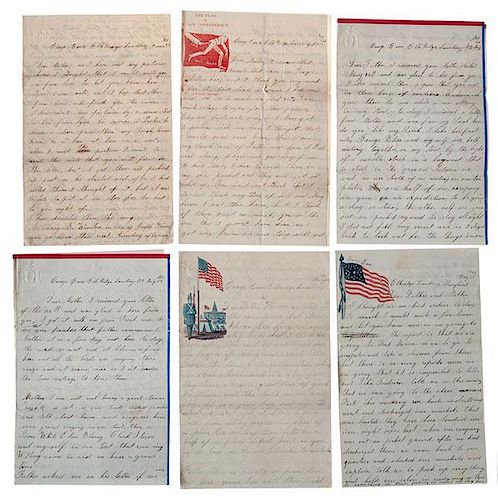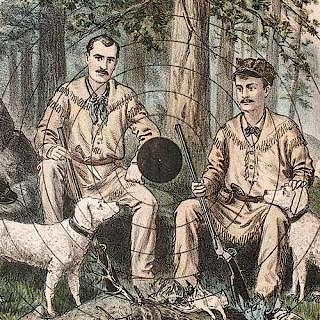Civil War Letter Archive of Brothers William H. and Charles E. Winslow, 8th Massachusetts Infantry
About Seller
6270 Este Ave.
Cincinnati , OH 45232
United States
With offices in Cincinnati, Cleveland and Denver, Cowan’s holds over 40 auctions each year, with annual sales exceeding $16M. We reach buyers around the globe, and take pride in our reputation for integrity, customer service and great results. A full-service house, Cowan’s Auctions specializes in Am...Read more
Two ways to bid:
- Leave a max absentee bid and the platform will bid on your behalf up to your maximum bid during the live auction.
- Bid live during the auction and your bids will be submitted real-time to the auctioneer.
Bid Increments
| Price | Bid Increment |
|---|---|
| $0 | $25 |
| $500 | $50 |
| $1,000 | $100 |
| $2,000 | $250 |
| $5,000 | $500 |
| $10,000 | $1,000 |
| $20,000 | $2,500 |
| $50,000 | $5,000 |
| $100,000 | $10,000 |
About Auction
Nov 20, 2015 - Nov 21, 2015
Cowan's Auctions dawnie@cowans.com
- Lot Description
Civil War Letter Archive of Brothers William H. and Charles E. Winslow, 8th Massachusetts Infantry
Lot of 52 letters, three on patriotic stationary, and three envelopes, written by William Henry and Charles E. Winslow to their family, ca 1861-1862.
Very few brothers were fortunate enough to fight alongside each other or be in the same company like the Winslow brothers. William Henry and Charles E. Winslow hailed from Marblehead, MA. They had the good fortune to not only be in the same regiment but also to serve in the same naval ship with several other men from their hometown. Hailing from the East coast, salt water pulsed through their veins and urged them into the Navy. William Henry and Charles enlisted on April 15, 1861. They mustered into the 8th MA Inf. Co. C. Both boys mustered out of Boston on August 1, 1861, but William continued his military career after Charles with the 4th MA Heavy Art. and 23rd MA Inf.
The 8th MA Vols., also referred to as "Minute Men," were called to Boston. The regiment had only eight companies, one company was added from the 7th Regt. and a zouve unit from Salem. Charles was particularly enamored with the zouves and mentioned them often. He writes, The Salem Zouves are teaching [our regiment the harctie drill] it is a fine drill. The Salem Zouves can load and fire (there is 100 of them) 1000 shots in a minute they load very fast (May 10, 1861). He encountered a second group of zouves from New York while he was in Washington. They look lik a hard set of men, writes Charles, they look as they would fight like tigers (May 29, 1861).
The boys saw little action during their first three months of service. They guarded the frigate Constitution in Annapolis until she was safely removed from the harbor to New York. One night, however, the boys’ regiment experienced some excitement when they mistook a passenger train for a CSA train. They saw a train of cars coming a long (they had orders to stop all trains) and they waved a lantern three times and the engenerr would not stop and about twelve or fourteen fired into the train, writes Charles. After they had stopped they went into the cars to serch and se if they was anything for them…the boys said when they went into the cars that the women were on there nease praying and taking in as if there hart would break, the men were scared almost to death they said they were for the union, and pled hard to let them go, they said that they thought they were seccionist troops…one of the shots graised by the engeneers chin and I gues that is what brought him to.
That same night another company detached under uncertain orders. Charles explains:
Our Capt and Capt Devouir of the Salem Zouves took half of our company and half of the Salem company, and some of the others companys to go out on a scouting party there was in all about 90 all together they went about 25 miles…They arrived back about 11 o’clock yesterday morning, after they had arrived back our Capt and Capt. Deverix was put under arrest by Col Jones of the 6 Regiment and was made to give up their swords! after that our company and the salem company marched up to the colonels quarters there arms reverse and give up there muskets they put them all in a heap in front of his tent…(May 31, 1861).
It remains a mystery as to why the company split and under what orders the captains acted. Charles reports that both men returned to their posts and resumed duty a few days later. That same month, the regiment leader, Col. Munroe resigned due to his advanced age and ill health. Col. Edward Hinks succeeded him. According to the Civil War Database, Hicks “was an officer destined to attain high rank before the war was done.” William Henry begged to differ, Hicks is as ugley as ugley can be, he wrote (July 23, 1861). Neither he nor Charles held Hicks in high regard.
Charles mustered out after three months, William resumed his service. He mustered into the 23rd MA Inf. Co. A. as a sergt. on September 28, 1861. He experienced more action on the front than his brother. We have had orders to sail to night at eight bels that is twelve o’clock to night, and if the lord spares my life I will give you a ful account of the fight, writes William Henry. He proved to be a good marksman on board. It did not go unnoticed by his fellow men or superiors, our secont litenant came to me this morning and had a long talk with me about the coming battol, writes William Henry, we are both together in the rear he told me he puts a grate deal confidence in me, he says captain Martin gives me a good name he sed he would be a good man in the battol because I was so cool...(February 1, 1862).
William Henry’s cool head earned him a spot as gunner and a leadership role on the Highlander. He writes:
I suppose my duties as a fillclouser will be hard in a fight that is to keep the men from braking and keep them as cool as posibal, we have got a very cool set of men I think rather cooler than the rest of the companies, they all seem so to me wen they have ben fireng. His men's efforts earned them a "prise," when they captured a sergeant major, drum major, and five privates. They stole a small skinner about 4 or 5 tuns and they ram into our fleet and was taken cair of, writes William (February 1, 1861).
The rebels almost captured William and his men in the Virginia swamps at Roanoke. We had to swim almost, writes William Henry, we looked like drowned rats wen we came out of the swamp, it puseld thous rebals to think we got through such a place, they were sure no one could get through to flank them…[the rebels] like Indians in woods, sum of them were up in the tops of trees, I made one get down rather quick I hapend to look up…I up rifol and fired he came down head first and hiting the ground like a mad dog… (March 1, 1862).
William Henry was wounded in battle on March 14, 1862 at New Berne, NC. He was discharged for his injury on December 6, 1862. He did not tell his family that he was wounded. Instead he wrote them that he had been sick. All the excitement did not amount to much of a life for either brother, it tis a very pretty thing to be a soldier at home but this making it a bisesness I dont like, wrote William from his hospital bed. I here that two more companies is recuting at home if so tell Charles not to inlest if he dus I sal think him more of a fool then I was (March 27, 1862).
William Henry was "a fool" and went against his own advice to his brother. He reentered military service in August of 1864 and mustered into the 2nd MA Heavy Art. as a corporal. He served until he mustered out at Washington, D.C., June 17, 1865. - Shipping Info
-
SHIPPING. At the request of the buyer, Cowan's will authorize the shipment of purchased items. Shipments usually occur within two weeks after payment has been received. Shipment is generally made via UPS Ground service. Unless buyer gives special instructions, the shipping method shall be at the sole discretion of Cowan's Auctions, Inc.. Cowan's is in no way responsible for the acts or omissions of independent handlers, packers or shippers of purchased items or for any loss, damage or delay from the packing or shipping of any property.
-
- Buyer's Premium



 EUR
EUR CAD
CAD AUD
AUD GBP
GBP MXN
MXN HKD
HKD CNY
CNY MYR
MYR SEK
SEK SGD
SGD CHF
CHF THB
THB













